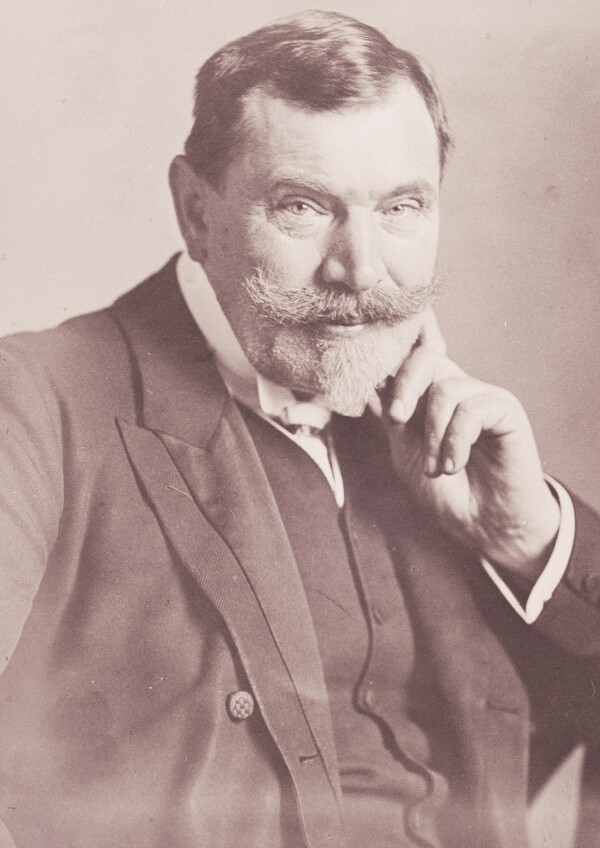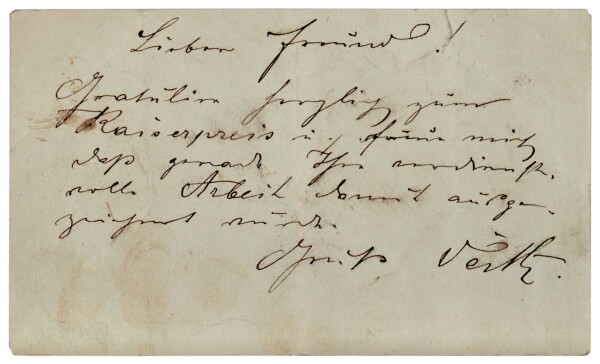Eduard Veith

Eduard Veith, Künstlerhaus Archive, Vienna
© Künstlerhaus-Archiv, Vienna
The painter Eduard Veith attended the Vienna School of Arts and Crafts, where Ferdinand Laufberger was his teacher. He enjoyed great success as a decorative painter working for theaters. One of his most famous works – a mosaic frieze – can still be seen today on the façade of a former Viennese hotel at No. 16 Kärntner Straße.
Eduard Veith was born in the Moravian town of Neutitschein (now Nový Jičín, Czech Republic) in 1858. In the 1870s, around the same time as Gustav Klimt, he was trained under Ferdinand Laufberger as a decorative painter at the Vienna School of Arts and Crafts. According to the magazine Moderne Welt, Veith later said about his former teacher:
“[A]s a sixty-year-old man, I cannot but realize over and over again how much to the point the advice he gave was and how steadily and felicitously he guided me and other students, including Klimt and Matsch, and how I would always be punished later on whenever I left the path indicated by him.”
It was toward the end of his studies and partly on Laufberger’s behalf that he traveled to Paris, Trieste, Venice, and Bucharest before returning to Vienna. However, due to a lack of success, he left the city and lived in Neutitschein and Paris for the next few years.

Eduard Veith: Triumph der Vindobona, competition sketch for the Volkstheater, 1888, Wien Museum
© Wien Museum
Success as a Decorative Painter
In 1887, Veith received the commission for the decoration of the Neues Deutsches Theater in Prague (now Státní opera, Prague), which was built by the well-known theater builders Fellner & Helmer. He went on to decorate numerous theaters in Austria and abroad, such as the Deutsches Volkstheater (now Volkstheater) in Vienna and the state opera Unter den Linden in Berlin.
Veith, who later also worked as a portraitist and watercolorist, became known above all for his prizewinning works for the ballroom at the Neue Burg in Vienna and for his monumental mosaic frieze on the façade of the former Viennese Hotel Meißl & Schadn at No. 16 Kärntner Straße.

Eduard Veith, Mosaic Orient and Occident on the façade of the Hotel Meißl & Schadn, 1896, Wien Museum
© Wien Museum

Eduard Veith: Correspondence Card from Eduard Veith in Vienna to Gustav Klimt in Vienna, 04/27/1890, The Albertina Museum
© The ALBERTINA Museum, Vienna
The artist died in Vienna in 1925. Four years later, the Künstlerhaus would organize an exhibition on the occasion of the auction of his artistic estate.
Acquaintance with Gustav Klimt
Eduard Veith and Gustav Klimt are known to have been acquainted. This is evidenced by a correspondence card from Eduard Veith (Klimt Archive, Albertina) in which he congratulated “his friend” Gustav Klimt on having been awarded the Emperor’s Prize in 1890. In addition, Veith and Klimt, together with other renowned artists, acted as jury members in the competition for the design of a monument to honor the composers Josef Lanner and Johann Strauss the Elder.
Literature and sources
- Silvia Freimann (Hg.): Eduard Veith (1858-1925). Kommentierter Werkkatalog mit Werkverzeichnis, Berlin 2011.
- C. J. Wawra (Hg.): Künstlerischer Nachlass Professor Eduard Veith, Vienna 1929.
- Moderne Welt, 1. Jg., Heft 11 (1919), S. 7-9.
- Neues Wiener Journal, 07.06.1929, S. 4.
- Neue Freie Presse, 08.01.1929, S. 24.
- Architekten- und Baumeister-Zeitung, 13.01.1901, S. 2.
- Felix Czeike (Hg.): Historisches Lexikon Wien, Band 5, Vienna 1997, S. 524-525.
- Österreichische Akademie der Wissenschaften (Hg.): Österreichisches Biographisches Lexikon 1815–1950, Band 15, Vienna 2017.
- Hans Vollmer (Hg.): Allgemeines Lexikon der Bildenden Künstler von der Antike bis zur Gegenwart. Begründet von Ulrich Thieme und Felix Becker, Band XXXIV, Leipzig 1940, S. 181.
- Korrespondenzkarte von Eduard Veith in Wien an Gustav Klimt in Wien (27.04.1890). GKA50.
- Klassenkataloge 1876–1881, .

